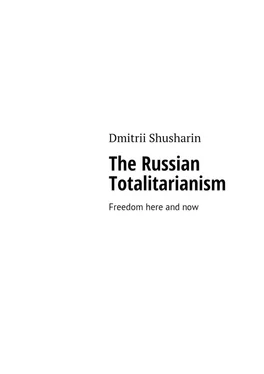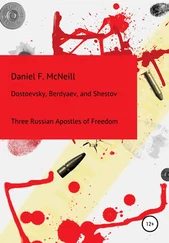Dmitrii Shusharin - The Russian Totalitarianism. Freedom here and now
Здесь есть возможность читать онлайн «Dmitrii Shusharin - The Russian Totalitarianism. Freedom here and now» — ознакомительный отрывок электронной книги совершенно бесплатно, а после прочтения отрывка купить полную версию. В некоторых случаях можно слушать аудио, скачать через торрент в формате fb2 и присутствует краткое содержание. ISBN: , Жанр: russian_contemporary, на английском языке. Описание произведения, (предисловие) а так же отзывы посетителей доступны на портале библиотеки ЛибКат.
- Название:The Russian Totalitarianism. Freedom here and now
- Автор:
- Жанр:
- Год:неизвестен
- ISBN:9785449069030
- Рейтинг книги:4.5 / 5. Голосов: 2
-
Избранное:Добавить в избранное
- Отзывы:
-
Ваша оценка:
- 100
- 1
- 2
- 3
- 4
- 5
The Russian Totalitarianism. Freedom here and now: краткое содержание, описание и аннотация
Предлагаем к чтению аннотацию, описание, краткое содержание или предисловие (зависит от того, что написал сам автор книги «The Russian Totalitarianism. Freedom here and now»). Если вы не нашли необходимую информацию о книге — напишите в комментариях, мы постараемся отыскать её.
The Russian Totalitarianism. Freedom here and now — читать онлайн ознакомительный отрывок
Ниже представлен текст книги, разбитый по страницам. Система сохранения места последней прочитанной страницы, позволяет с удобством читать онлайн бесплатно книгу «The Russian Totalitarianism. Freedom here and now», без необходимости каждый раз заново искать на чём Вы остановились. Поставьте закладку, и сможете в любой момент перейти на страницу, на которой закончили чтение.
Интервал:
Закладка:
The man of the crowd on the throne
Nearly twenty years after the appearance of Vidojevic’s book we may talk about overcoming neo-totalitarianism in two different ways.
Now it is obvious that the so-called color-coded revolutions (the first one was in Serbia) were a continuation of the velvet revolutions that ended the totalitarian occupation, the tank-enforced socialism. Color revolutions were aimed to overthrow the newly established totalitarianism in post-soviet states.
At the turn of the century the major differences in the development of Eastern Europe and Russia became apparent. Step by step Russia has been moving back to a totalitarian mode, reverting to the patterns of classic totalitarianism. The development of civil societies in Georgia and Ukraine has been naturally oriented to the European political culture, which was becoming increasingly alien to Russia. The development of civil societies in Georgia and Ukraine has been naturally oriented to the European political culture, from which Russia was becoming increasingly alienated. Russia declined the historic chance to build the union of democracies in Eastern Europe and wider in Eurasia, which would become one of the centers of the Judeo-Christian civilization. The European choice of the neighbors came to be regarded as a threat not only to the entrenched ruling elite, but also to the Russian identity, the totalitarian Russian civilization, which positions itself as anti-civilization with no positive values and achievements.
This is the second essential feature of totalitarianism. The first, as already mentioned, is its atavistic character – this term is applicable only to countries where a disruption of democratic development occurred along with their secession from the Judeo-Christian civilization. Any totalitarian value is a reversed value, regardless of its ideological design. This is one of the principal differences between totalitarianism and the traditional societies with their self-sufficiency and Latin American dictatorships integrated in the Western world. Antiglobalism and leftist movements of the last decades have significantly strengthened the totalitarian tendencies on this continent, made openly left-wing Venezuela an ally of Russia, where the right-wing ideas – monarchism, clericalism, chauvinism are proclaimed.
The demonization and humiliation of Putin and those around him is a useless and pointless undertaking. People, who came to power in the last years of the last century, did not pursue some insane goals. Vladimir Putin was the homunculus grown in a test-tube of political technology. Nobody wanted him to become a totalitarian leader, but the very selection criteria were totalitarian: it seemed the perfect choice was a man without qualities. This was fully consistent with the spirit and content of the political technologies of that time, totalitarian in its core, since for the Russian political strategists a human being and society have always been superfluous, unnecessary elements.
The rulers of Russia did not set themselves a totalitarian overarching goal. But they did not put other goals either. All they need is their lifelong irremovability in power and their convertibility. The human dimension of politics, state activity, public service does not exist for them. They do not even deny morality, they do not talk about the chimera of conscience – they just argue and act outside of these categories, considering them suitable only for political demagogy.
In October 2004, I described the emerging regime as follows:
“It is wrong to accuse the power in the absence of ideology. Its ideology is simple, has been known since the Soviet era and is reduced to a simple formula: what I protect is what I have. This simplicity ensures high ratings. The public does not want to grow up and this formula is the most germane to the infantilism, so typical for the mentality of Soviet secret police and all other kind of watchmen. Everything is all right with the goal setting and the sense of purpose: the main thing is to secure a comfortable old age with the assets they are in charge of protecting. But the protected object, besides oil, gas, alcohol and still sellable weapons, lives a life controlled by the most incomprehensible manner. And even with one hundred percent approval rating no caretaker, no guard, no watchman can feel completely in control of the situation. Rather, the situation controls them. With the expansion of the control zone the controllers are becoming all the more acutely feeling that they are under control of those “standing outside of life” forces. The higher a person stands in a totalitarian social hierarchy, the more insecure is the position, the less freedom to maneuver is available, the stronger the sense of being a victim, known in psychology as victimization.
That is why we have “the first person”, or Nachalnik (the Boss), as he is called now in his inner circle (not Master as Stalin was referred to or Bat’ka (daddy, or Old Man) like Lukashenka). He is doomed to loneliness, fear, and lack of trust in the closest of his associates, who are also bored and sad. There is no reason to suspect that the people in this circle feel comfortable nowadays. Actually, after the Boss they are the first victims of the coming totalitarianism.” 14 14 http://polit.ru/article/2004/10/21/ing/
Then, something paradoxical came forward in Russia, it was local totalitarianism, which, of course, is contradictio in adjecto, but in fact it had taken place. It was totalitarianism for the elite. And then, by its inner nature and the very essence of the Russian power being totalitarian, the first priority of the government was already to secure its own irremovability and controlled succession, a task that can be accomplished only by totalitarian methods. By means of the destruction of the state, political parties, all forms of social autonomy, the atomization of society and its transformation into a mass. And it could not be done without a sense of besieged country, hostility rings, the Orwellian “five minutes of hatred” and other devices of consolidation and mobilization of the masses.
The current stage of the regime development mode, conventionally referred to as Putin’s regime, is determined by the task of mobilizing the masses. Putin has succeeded in consolidation of the elites. Now there is a need to consolidate the population for the purpose of its further alienation from politics and strengthening of its controllability.
Varlam Shalamov said this about his prose:
“My stories are, in essence, advice to a person, how to behave in a crowd.”
He was talking about his “Kolyma stories”, which are all about the life of the crowd and the person within it in conditions of complete dehumanization.
But who are the ones this advice addressed to, after all that happened in Kolyma camps? A person in a crowd is one thing. A person of the crowd is quite another. And this is not at all a common thief, as Shalamov said clearly: “thieves are not people.” And has not the person for whom the crowd was alien and hostile stayed forever on Kolyma, in Vorkuta, or in other famous camps? And since Kolyma became possible, was there even such type of person in existence?
Hannah Arendt, referring to the former model of totalitarianism, said that the leader was “an official from the masses”, “a leader without the masses is nothing, a fiction.” Nevertheless, the totalitarianism of the past, in Shalamov’s testimony, required a charismatic leader. The long stay in power of Vladimir Putin shows that in the era of mass culture and communication revolution the totalitarian leader finally and decisively turns into a man of the crowd.
The secret of Putin’s success is the lack of charisma of the people in power, their mimicry and essential merger with the majority. The intrinsic trend in the former totalitarian model became a fundamental attribute of today’s ruling class: the mass absorbs power, making it subjectless.
Читать дальшеИнтервал:
Закладка:
Похожие книги на «The Russian Totalitarianism. Freedom here and now»
Представляем Вашему вниманию похожие книги на «The Russian Totalitarianism. Freedom here and now» списком для выбора. Мы отобрали схожую по названию и смыслу литературу в надежде предоставить читателям больше вариантов отыскать новые, интересные, ещё непрочитанные произведения.
Обсуждение, отзывы о книге «The Russian Totalitarianism. Freedom here and now» и просто собственные мнения читателей. Оставьте ваши комментарии, напишите, что Вы думаете о произведении, его смысле или главных героях. Укажите что конкретно понравилось, а что нет, и почему Вы так считаете.












